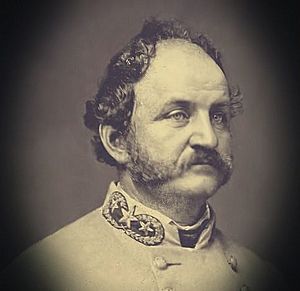John Stuart Williams facts for kids
Quick facts for kids
John Stuart Williams
|
|
|---|---|
 |
|
| United States Senator from Kentucky |
|
| In office March 4, 1879 – March 3, 1885 |
|
| Preceded by | Thomas C. McCreery |
| Succeeded by | Joseph C. S. Blackburn |
| Member of the Kentucky House of Representatives | |
| In office 1851 1853 |
|
| Personal details | |
| Born | July 10, 1818 Mount Sterling, Kentucky |
| Died | July 17, 1898 (aged 80) Mount Sterling, Kentucky |
| Resting place | Winchester Cemetery, Winchester, Kentucky |
| Political party | Democratic |
| Alma mater | Miami University |
| Profession | Lawyer |
| Nickname | "Cerro Gordo" Williams |
| Military service | |
| Allegiance | United States Confederate States of America |
| Branch/service | United States Army Confederate States Army |
| Years of service | 1846–1848 1861–1865 |
| Rank | Colonel Brigadier General (CSA) |
| Unit | 6th U.S. Infantry 4th Regiment of Kentucky Volunteers 5th Kentucky Infantry |
| Commands | Department of Southwestern Virginia |
| Battles/wars | Mexican–American War American Civil War |
John Stuart Williams (July 10, 1818 – July 17, 1898) was an important figure in American history. He served as a general in the Confederate States Army during the American Civil War. After the war, he became a Democratic U.S. Senator for Kentucky.
Early Life and Career
John Stuart Williams was born near Mount Sterling, Kentucky. He went to local schools and then graduated from Miami University in Oxford, Ohio, in 1839. After college, he studied law and became a lawyer in 1840. He started his law practice in Paris, Kentucky.
Williams also served in the Mexican–American War. He began as a captain and later became a colonel. He earned the nickname "Cerro Gordo Williams" because he was very brave during the Battle of Cerro Gordo.
In the 1850s, Williams was a member of the Kentucky House of Representatives. He was known for supporting "states' rights." This idea meant that individual states should have more power than the national government. At first, he did not want states to leave the United States. However, he disagreed with President Abraham Lincoln's actions and decided to join the Confederacy.
Civil War Service
When the Civil War began, John Williams became a colonel in the 5th Kentucky Infantry. He fought in the eastern part of the war, including battles in Virginia. He was part of an invasion of eastern Kentucky in 1862. He also fought in the Battle of Princeton Court House.
Later, in 1862, he was promoted to brigadier general. He temporarily commanded the Department of Southwestern Virginia. He then organized a group of cavalry (soldiers on horseback). He helped to stop a Union invasion of eastern Tennessee in 1863, fighting in the Battle of Blue Springs.
In 1864, General Williams moved to Georgia. He took command of Kentucky soldiers in the cavalry. He was praised by the Confederate Congress for his actions at the Battle of Saltville. He surrendered in 1865 when the war ended.
Life After the War
After the Civil War, Williams returned home to Winchester, Kentucky. He became a farmer.
He continued his political career. He was again a member of the Kentucky State House in 1873 and 1875. He ran for Governor of Kentucky in 1875 but did not win. In 1876, he was chosen to be a presidential elector for the Democratic Party.
In 1879, John Williams was elected to the United States Senate. He served as a U.S. Senator from March 4, 1879, to March 3, 1885. He tried to be re-elected but was not successful. After his time in the Senate, he went back to farming.
In the late 1880s, Williams also became involved in developing land in Florida. With a business partner, Walter N. Haldeman, he helped to create the town of Naples, Florida.
John Stuart Williams passed away in Mount Sterling in 1898. He was buried in Winchester Cemetery in Winchester.
 | Madam C. J. Walker |
 | Janet Emerson Bashen |
 | Annie Turnbo Malone |
 | Maggie L. Walker |

